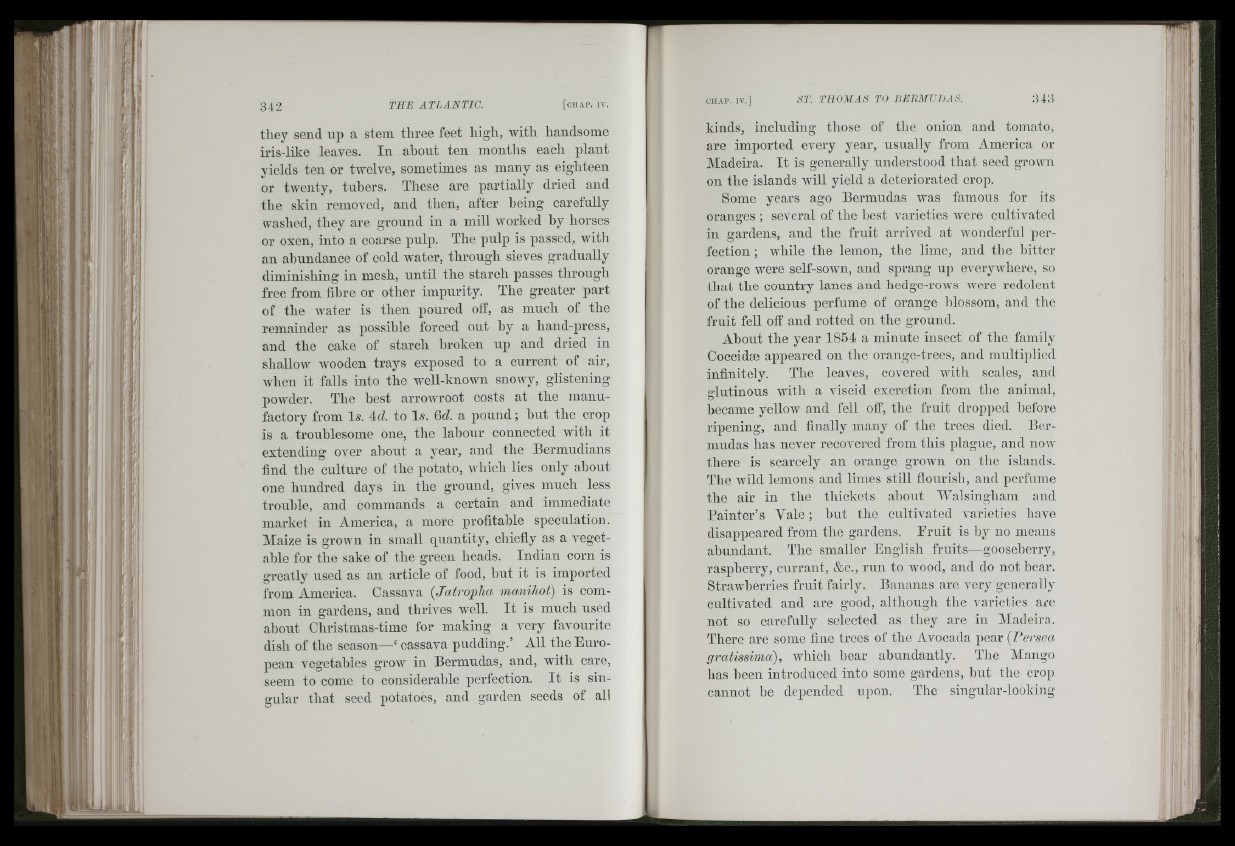
n
Ái;í
lili:
they send up a stem three feet high, with handsome
iris-like leaves. In about ten months each plant
yields ten or twelve, sometimes as many as eighteen
or twenty, tubers. These are partially dried and
the skin removed, and then, after being carefully
washed, they are ground in a mill worked by horses
or oxen, into a coarse pulp. The pulp is passed, with
an ahundance of cold water, through sieves gradually
diminishing in mesh, until the starch passes through
free from fibre or other impurity. The greater part
of the water is then poured off, as much of the
remainder as possible forced out hy a hand-press,
and the cake of starch broken up and dried in
shallow Avooden trays exposed to a current of air,
Avhen it falls into the well-known snoAvy, glistening
powder. The best arroAvroot costs at the manufactory
from Is. Ad. to Is. 6d. a pound; hut the crop
is a troublesome one, the labour connected with it
extending over about a year, and the Bermudians
find the culture of the potato, Avhich lies only ahout
one hundred days in the ground, gives much less
trouble, and commands a certain and immediate
market in America, a more profitable speculation.
Maize is grown in small quantity, chiefly as a vegetable
for the sake of the green heads. Indian corn is
greatly used as an article of food, but it is imported
from America. Cassava {Jatroplia mcmihot) is common
in gardens, and thrives Avell. It is much used
ahout Christmas-time for making a very favourite
dish of the season—‘ cassava pudding.’ All the European
vegetables groAV in Bermudas, and, with care,
seem to come to considerable perfection. It is singular
that seed potatoes, and garden seeds of all
kinds, including those of the onion and tomato,
are imported every year, usually from America or
Madeira. It is generally understood that seed groAvn
on the islands Avill yield a deteriorated crop.
Some years ago Bermudas was famous for its
oranges ; several of the best varieties were cultivated
in gardens, and the fruit arrived at Avonderful perfection
; while the lemon, the lime, and the hitter
orange Avere self-sown, and sprang np everywhere, so
that the country lanes and hedge-roAvs Avere redolent
of the delicious perfume of orange blossom, and the
fruit fell off and rotted on the ground.
About the year 1854 a minute insect of the family
Coccidae appeared on the orange-trees, and multiplied
infinitely. The leaves, covered Avith scales, and
fflntinous with a viscid excretion from the animal,
became yelloAV and fell off, the fruit dropped before
ripening, and finally many of the trees died. Bermudas
has never recovered from this plague, and u o a v
there is scarcely an orange groAvn on the islands.
The wild lemons and limes still flourish, and perfume
the air in the thickets about lYalsingham and
Painter’s V a le ; hut the cultivated varieties have
disappeared from the gardens. Emit is hy no means
abundant. The smaller English fruits—gooseberry,
raspberry, currant, &c., run to AVOod, and do not bear.
Strawberries fruit fairly. Bananas are very generally
cultivated and are good, although the varieties are
not so carefully selected as they are in Madeira.
There are some fine trees of the Avocada pear {Persea
gratissima), Avhich hear abundantly. The Mango
has been introduced into some gardens, hut the crop
cannot he depended upon. The singular-looking
IH-IiI 4I
: I- ii Iii
m "
i ' i i i i ü i j I;
ÍIüit'í ,ii i.: I:
-iii I I
I.
A
!:p H'l;
f “
I
4i I
■ H i Í